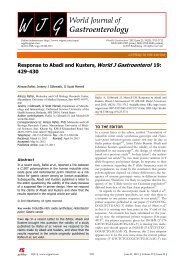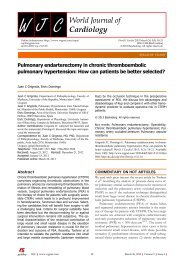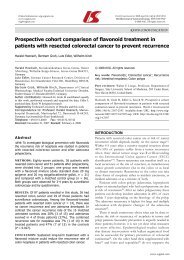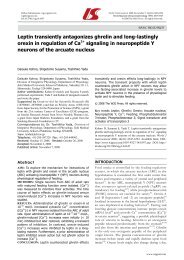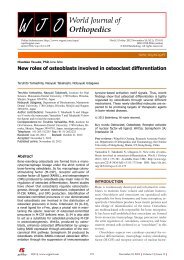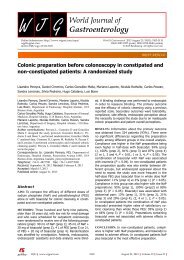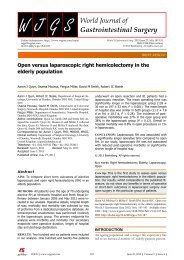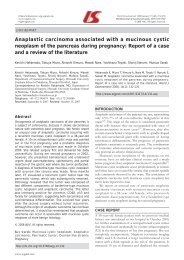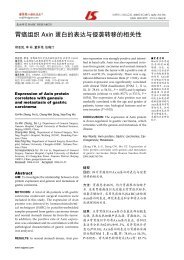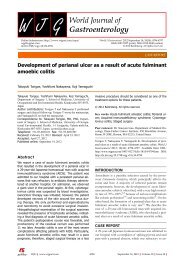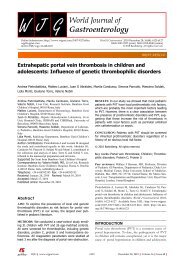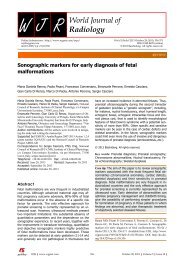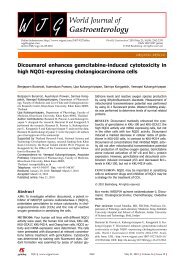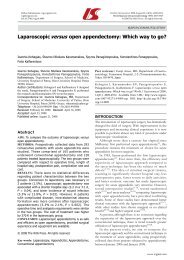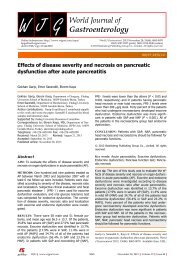18 - World Journal of Gastroenterology
18 - World Journal of Gastroenterology
18 - World Journal of Gastroenterology
Create successful ePaper yourself
Turn your PDF publications into a flip-book with our unique Google optimized e-Paper software.
26<strong>18</strong> ISSN 1007-9327 CN 14-1219/R <strong>World</strong> J Gastroenterol May 14, 2007 Volume 13 Number <strong>18</strong><br />
in rat pancreatectomy model and PDX-1 was re-activated<br />
in the ductal cells, thereby suggesting that re-activation <strong>of</strong><br />
PDX-1 is a marker <strong>of</strong> pancreatic stem cells.<br />
There is overwhelming evidence that cancer stem<br />
cells, which are considered to originate from somatic stem<br />
cells, should be responsible for tumors malignancy [17] .<br />
Miyamoto et al [9] found that signal molecules that regulate<br />
proliferation and differentiation <strong>of</strong> embryonic stem cell<br />
were activated in human pancreatic cancers. Thus, we<br />
deduced that PDX-1 may be re-activated in the process <strong>of</strong><br />
transformation from pancreatic stem cells to pancreatic<br />
cancer stem cells.<br />
To investigate whether PDX-1 was re-expressed<br />
in pancreatic cancer and its role in pancreatic cancer<br />
development, we detected PDX-1 protein and mRNA<br />
expression in 56 pancreatic cancer tissues. To validate<br />
the used methods, we also analyzed normal human<br />
pancreatic tissues. Results <strong>of</strong> immunohistochemistry<br />
indicated that PDX-1 was only weekly expressed in beta<br />
cells <strong>of</strong> the pancreatic islet in normal pancreatic tissues,<br />
which is in agreement with previous studies in mice and<br />
human pancreas [11,12] , but PDX-1 was re-activated in<br />
pancreatic cancers. About 41.1% samples showed positive<br />
immunostaining for PDX-1 in the cytoplasm and nuclei<br />
<strong>of</strong> cells, especially in the cells located at the leading edge<br />
<strong>of</strong> infiltration, thereby implying that PDX-1 plays a role in<br />
pancreatic cancer infiltration. Results <strong>of</strong> Western blot were<br />
in consonance with that <strong>of</strong> immunohistochemistry. In<br />
addition, we analyzed the correlation <strong>of</strong> PDX-1 expression<br />
with tumor characteristics. We found that lymph node<br />
metastasis, TNM grading and pathological grading were all<br />
significantly correlated with PDX-1 expression.<br />
To study the correlation <strong>of</strong> PDX-1 expression with<br />
cell proliferation, we detected the expression <strong>of</strong> PCNA in<br />
pancreatic cancer by immunohistochemistry. The positive<br />
rate <strong>of</strong> PCNA in PDX-1-positive samples was as high as<br />
78.2%, whereas that in PDX-1-negative samples was only<br />
36.4%, suggesting that PDX-1-positive cells had higher<br />
potential <strong>of</strong> proliferation. Many studies have demonstrated<br />
high frequency <strong>of</strong> mutations <strong>of</strong> oncogene such as K-ras<br />
and tumor suppressor genes such as p16, p53 in pancreatic<br />
cancer tissues and cell lines [8,<strong>18</strong>,19] . Based on our study, we<br />
deduced that the alteration <strong>of</strong> PDX-1 expression might<br />
represent one <strong>of</strong> those genetic changes.<br />
In summary, PDX-1 is re-expressed in pancreatic<br />
cancers, and its expression level has a significant correlation<br />
with pathological grading, TNM grading, tumor metastasis<br />
and tumor cell proliferation. Since PDX-1 is considered a<br />
marker <strong>of</strong> pancreatic stem cells, we tentatively put forward<br />
that cells that express PDX-1 in pancreatic cancers may be<br />
cancer stem cells. How does the PDX-1 molecule affect<br />
the malignancy <strong>of</strong> a particular cell is awaited to be studied<br />
in our future work.<br />
ACKNOWLEDGMENTS<br />
The authors are grateful to the technical assistance from<br />
Yuan Tian and Jin-Hui Zhang, the Research Laboratory <strong>of</strong><br />
www.wjgnet.com<br />
General Surgery, Union Hospital, Wuhan.<br />
REFERENCES<br />
1 Pardal R, Clarke MF, Morrison SJ. Applying the principles <strong>of</strong><br />
stem-cell biology to cancer. Nat Rev Cancer 2003; 3: 895-902<br />
2 Bonnet D, Dick JE. Human acute myeloid leukemia is<br />
organized as a hierarchy that originates from a primitive<br />
hematopoietic cell. Nat Med 1997; 3: 730-737<br />
3 Al-Hajj M, Wicha MS, Benito-Hernandez A, Morrison SJ,<br />
Clarke MF. Prospective identification <strong>of</strong> tumorigenic breast<br />
cancer cells. Proc Natl Acad Sci USA 2003; 100: 3983-3988<br />
4 Singh SK, Clarke ID, Terasaki M, Bonn VE, Hawkins C, Squire<br />
J, Dirks PB. Identification <strong>of</strong> a cancer stem cell in human brain<br />
tumors. Cancer Res 2003; 63: 5821-5828<br />
5 Collins AT, Berry PA, Hyde C, Stower MJ, Maitland NJ.<br />
Prospective identification <strong>of</strong> tumorigenic prostate cancer stem<br />
cells. Cancer Res 2005; 65: 10946-10951<br />
6 Kim CF, Jackson EL, Woolfenden AE, Lawrence S, Babar I,<br />
Vogel S, Crowley D, Bronson RT, Jacks T. Identification <strong>of</strong><br />
bronchioalveolar stem cells in normal lung and lung cancer.<br />
Cell 2005; 121: 823-835<br />
7 Bonner-Weir S, Taneja M, Weir GC, Tatarkiewicz K, Song KH,<br />
Sharma A, O’Neil JJ. In vitro cultivation <strong>of</strong> human islets from<br />
expanded ductal tissue. Proc Natl Acad Sci USA 2000; 97: 7999-8004<br />
8 Aguirre AJ, Bardeesy N, Sinha M, Lopez L, Tuveson DA,<br />
Horner J, Redston MS, DePinho RA. Activated Kras and<br />
Ink4a/Arf deficiency cooperate to produce metastatic<br />
pancreatic ductal adenocarcinoma. Genes Dev 2003; 17:<br />
3112-3126<br />
9 Miyamoto Y, Maitra A, Ghosh B, Zechner U, Argani P,<br />
Iacobuzio-Donahue CA, Sriuranpong V, Iso T, Meszoely IM,<br />
Wolfe MS, Hruban RH, Ball DW, Schmid RM, Leach SD.<br />
Notch mediates TGF alpha-induced changes in epithelial<br />
differentiation during pancreatic tumorigenesis. Cancer Cell<br />
2003; 3: 565-576<br />
10 Edlund H. Pancreatic organogenesis--developmental<br />
mechanisms and implications for therapy. Nat Rev Genet 2002;<br />
3: 524-532<br />
11 Jonsson J, Carlsson L, Edlund T, Edlund H. Insulin-promoterfactor<br />
1 is required for pancreas development in mice. Nature<br />
1994; 371: 606-609<br />
12 Gerrish K, Gannon M, Shih D, Henderson E, St<strong>of</strong>fel M, Wright<br />
CV, Stein R. Pancreatic beta cell-specific transcription <strong>of</strong> the pdx-1<br />
gene. The role <strong>of</strong> conserved upstream control regions and their<br />
hepatic nuclear factor 3beta sites. J Biol Chem 2000; 275: 3485-3492<br />
13 Risbud MV, Bhonde RR. Models <strong>of</strong> pancreatic regeneration in<br />
diabetes. Diabetes Res Clin Pract 2002; 58: 155-165<br />
14 Sharma A, Zangen DH, Reitz P, Taneja M, Lissauer ME, Miller<br />
CP, Weir GC, Habener JF, Bonner-Weir S. The homeodomain<br />
protein IDX-1 increases after an early burst <strong>of</strong> proliferation<br />
during pancreatic regeneration. Diabetes 1999; 48: 507-513<br />
15 Hosotani R, Ida J, Kogire M, Fujimoto K, Doi R, Imamura M.<br />
Expression <strong>of</strong> pancreatic duodenal hoemobox-1 in pancreatic islet<br />
neogenesis after surgical wrapping in rats. Surgery 2004; 135: 297-306<br />
16 Marshak S, Benshushan E, Shoshkes M, Havin L, Cerasi E,<br />
Melloul D. Functional conservation <strong>of</strong> regulatory elements in<br />
the pdx-1 gene: PDX-1 and hepatocyte nuclear factor 3beta<br />
transcription factors mediate beta-cell-specific expression. Mol<br />
Cell Biol 2000; 20: 7583-7590<br />
17 Reya T, Morrison SJ, Clarke MF, Weissman IL. Stem cells,<br />
cancer, and cancer stem cells. Nature 2001; 414: 105-111<br />
<strong>18</strong> Jeong J, Park YN, Park JS, Yoon DS, Chi HS, Kim BR. Clinical<br />
significance <strong>of</strong> p16 protein expression loss and aberrant p53 protein<br />
expression in pancreatic cancer. Yonsei Med J 2005; 46: 519-525<br />
19 Khorana AA, Hu YC, Ryan CK, Komorowski RA, Hostetter<br />
G, Ahrendt SA. Vascular endothelial growth factor and DPC4<br />
predict adjuvant therapy outcomes in resected pancreatic<br />
cancer. J Gastrointest Surg 2005; 9: 903-911<br />
S- Editor Liu Y L- Editor Kumar M E- Editor Wang HF



